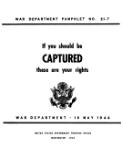Tags: military affairs military statements
Year: 1944
Text
WAR DEPARTMENT PAMPHLET No. 20-10
WAR DEPARTMENT
Washington 25, D. C., 15 March 1944
War Department Pamphlet No. 20-10 is pub-
lished for the information and guidance of all
concerned.
[A. G. 461 (25 Apr 44).]
By order of the Secretary of War:
G. C. MARSHALL,
Chief of Staff.
Official:
J. A. ULIO,
Major General,
The Adjutant General.
WELCOME HOME!
You’re returning to the greatest country in
the world from the greatest experience of a life-
time in the greatest of all wars.
★ Everybody at home is going to make a fuss
over you. They’ll give you a big welcome.
They’ll ask you endless questions.
л It’s only natural that you’ll want to tell them
all about it.
BUT when you talk remember this:
Hearsay information originating from returned
soldiers is one of the most important sources of
information to the enemy.
★ You probably have the feeling you’ve
left the enemy far behind you. You
haven’t. Naturally, he’s doing his best
to operate in America.
The Army isn’t so much worried about your
shooting your mouth off to strangers. You've
been around and know better.
The Army i± concerned
about your friends,
neighbors, family, and
even local newspapers,
innocently spreading
things that you might
tell them.
How your folks’ eyes will bug out if you tell
them everything you’ve seen! They’ll eat it up—
they’ll love it. It’s going to be tough to hold back.
They’re dying to know every detail.
But others may die
if you tell all you know!
"fc If you’re a hero the big newspapers and radio
networks will want your story. But even if you’re
just an average G. I. the hometown papers will
probably be after you—every soldier returning
from overseas has a story to tell. In all such
stories there are interesting facts the enemy
would like to know. No soldier will knowingly
reveal information which risks the lives of his
comrades—no American newspaper will knowing-
ly print it.
But often enough to cause serious concern, such
facts are revealed through carelessness.
It’s going to be hard to resist that natural urge
to impress your hometown folks by getting a big
eplash in print. But if what you say violates
Army Regulations or any of the points outlined
in this booklet, don’t say it. Not even off the
record—there's no “off the record" in war.
24 HOUR SERVICE
News published in U. S. newspapers has reached
enemy countries within 24 hours. Don’t talk to
the press at all unless a Public Relations Officer
has cleared your story. Whatever becomes
printed cannot be unsaid.
о
Stick to PERSONAL
experiences
If you limit your conversation to human
interest, first hand, eye witness accounts of your
own experiences, you’ll probably be on the safe
side. Just don’t get specific unless the Public
Relations Officer says you can. It’s also OK to
give general descriptions of the countries you’ve
been in, and discuss the habits and customs of
the natives there.
Opinions
Don’t identify your unit without first getting
permission from a Public Relations Officer.
Don’t mention specific places where you’ve
been stationed. Use authorized generalizations
like New Guinea, Italy, Northern Ireland, etc.
Don’t mention secret arms, equipment, pro-
cedures, flying techniques, strength of units, or
figures on casualties.
Don’t air opinions about fellow soldiers you
may not like. Don’t criticize our Allies.
P.S. So long аз you are a soldier you are subject to military procedures
and law. Severe penalties for violation of Security Regulations are just
as applicable in America as Overseas.
and predictions are OUT!
Few persons in this war are in such a position
that they are qualified to make overall judgments.
Decisions and criticisms of strategy or broad mili-
tary operations should be left to those authorized
to speak about them. Complaints about equip-
ment or training are not subjects for public dis-
cussion— there are effective and proper ways to
make suggestions within the Army. Do not
voice opinions on politics or any issue of civilian
controversy.
MUM’S THE WORD
on escapes and evasions
★ И you have been captured by the enemy and
have escaped, don’t give details of your escape.
The method you used may be helpful to others, if
the enemy doesn’t know too much about it. The
same thing goes for any story that you might
know about evasion of capture in enemy territory;
the people who helped you can still help others.
Your PRO* is your pal...
Remember—don’t give any interview or publish
anything or make any public appearance without
first checking with the nearest PRO and “getting
clearance.” That’s an Army regulation. You
can get in plenty trouble by forgetting it. The
fact is, of course, that the PRO is your pal. His
job is to advise you and to keep you out of
trouble.
★ Public Relations Officer.
The public at home plays a great part in the war
effort. They supply the money for war, the
materials of war, and countless services that
enable the Army to carry on. They are sharing
this war with you, and the Army believes these
folks have a right to be as fully informed as
possible.
But no American would want to know anything,
however small, that would be dangerous to know.
Even if he could evaluate its danger he would
prefer not to carry in his mind a potential weapon
against the soldier overseas.
U. ». QOVKBXMfM CH yriHC
Silence means Security
Show this booklet to anyone
who asks too many questions.
It may help to explain why
you cannot answer them all.



















